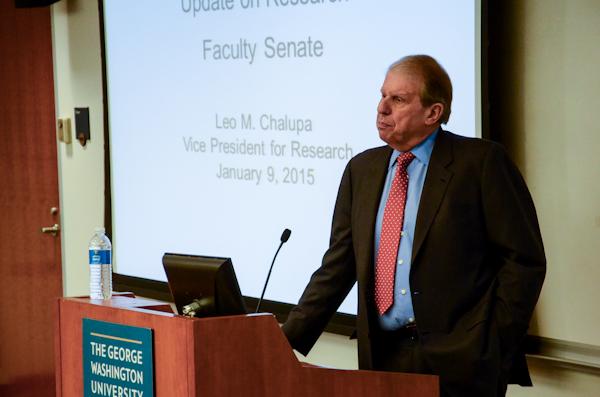Updated: Jan. 25, 2016 at 5:40 p.m.
A former research fund has been shut down and will be replaced by a new one with differing requirements, officials confirmed last week.
The Centers and Institutes Facilitating Fund was suspended for the past fiscal year and will be converted into a new program, called the Cross-Disciplinary Intramural Funding program. Researchers said the change was shocking, and while the original program is being replaced, they questioned the new setup and what it will mean for future funding.
The original fund was created in 2010 to help researchers receive outside grants and provide additional funding for researchers who weren’t able to get external funds. The awardees received two-year grants that helped cover the costs for their equipment, technicians and visiting scholars, and only directors of institutes or centers at GW were able to apply for grants.
Vice President for Research Leo Chalupa said in an email that officials have changed the eligibility requirements for the fund. Now, the fund is “extended” and faculty are eligible to apply as long as research is conducted across two or more schools.
He said because the eligibility is being expanded beyond directors and centers, it “felt appropriate to rename it.”
Chalupa said that details of the fund are being finalized and will be released in the coming weeks. No announcement has been made about when the changes will be implemented.
William Briscoe, the chair of the physics department, said the news was upsetting to hear because he will no longer be able to apply for research funding that doesn’t include work from at least one other school. He said this could prevent researchers from doing in-depth work in one field.
“My opinion is that this is the wrong thing to do,” Briscoe said. “It is moving in the opposite direction, there should be more focus here.”
Harald Greisshammer, an associate professor of physics, said in an email that CIFF funding provided vital support for focused research efforts and was an excellent tool to attract matching funds.
Greisshammer said that funding officers recently came to campus and asked why GW was not supporting nuclear physics in the same capacity that it used to. He said that the funding mechanism that typically awarded umbrella grants for the Institute for Nuclear Studies was no longer available.
“We had to answer that GW eliminated that funding mechanism altogether,” Greisshammer said. “And that leaves, of course, not the best impression.”
Research funding from federal agencies has become more competitive in recent years and some researchers have turned to private funding because of the decrease in federal funds.
Maria Cecilia Zea, professor of psychology, said in an email that she was not aware of the change. Zea said investment in research programs like CIFF is essential for GW to maintain federal funding.
She added that federal funding levels have not increased in many years and it has become harder to remain funded because only 6 percent of applications receive funding.
“It would be catastrophic to end CIFF because many GW centers depend on this fund to write grant applications,” Zea said.
Ellie Smith contributed reporting.







